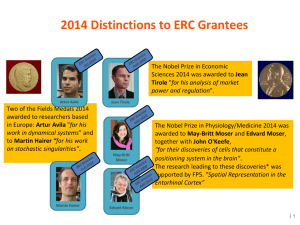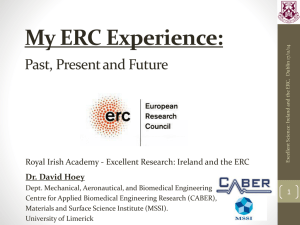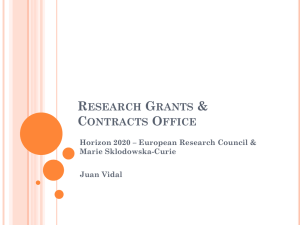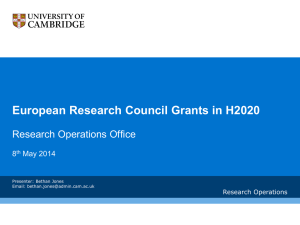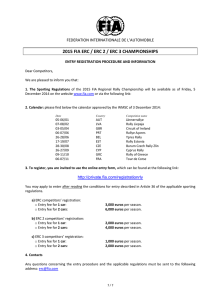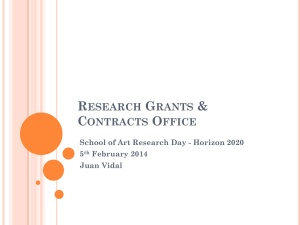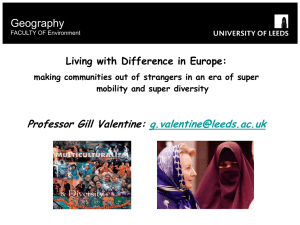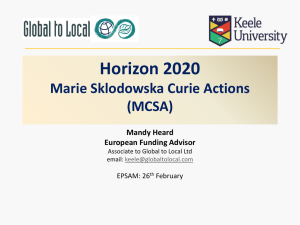European Research Council
advertisement
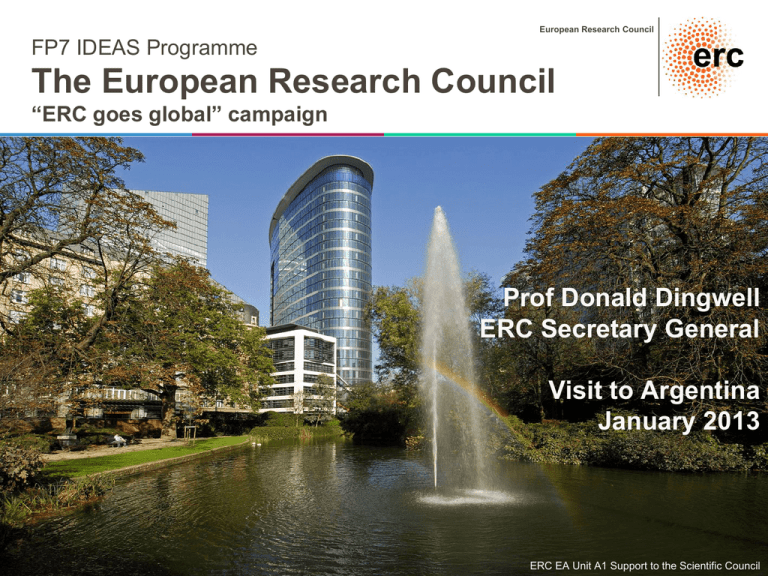
European Research Council FP7 IDEAS Programme The European Research Council “ERC goes global” campaign Prof Donald Dingwell ERC Secretary General Visit to Argentina January 2013 ERC EA Unit A1 Support to the Scientific Council European Research Council The European Research Council What is ERC European Research Council What is ERC? The ERC supports excellence in frontier research through a bottom-up, individual-based, pan-European competition Legislation Scientific governance: independent Scientific Council with 22 members; full authority over funding strategy Support by the ERC Executive Agency (autonomous) Excellence as the only criterion Strategy Budget: € 7.5billion (2007-2013) - 1.1 billion €/year Support for the individual scientist – no networks! Global peer-review No predetermined subjects (bottom-up) Support of frontier research in all fields of science and humanities │2 European Research Council FP7 budget € 50.5 billion ERC budget € 7.5 billion; Increase by € 250 M/year People (9 %) Ideas (15 %) Co-operation (65 %) 1800 23.4% 21.6% 1500 1200 17.8% 900 15.1% 600 10.8% 7.3% 300 4% 0 2007 2008 2009 2010 2011 2012 2013 Million Euro JRC nonnuclear (3 %) Capacities (8 %) European Research Council ERC Structure The European Commission • • • • Provides financing through the EU framework programmes Guarantees autonomy of the ERC Assures the integrity and accountability of the ERC Adopts annual work programmes as established by the Scientific Council The ERC Scientific Council • 22 prominent researchers proposed by an independent identification committee • • Appointed by the Commission (4 years, renewable once) Establishes overall scientific strategy; annual work programmes (incl. calls for proposals, evaluation criteria); peer review methodology; selection and accreditation of experts • • Controls quality of operations and management Ensures communication with the scientific community The ERC Executive Agency • • • • • • Executes annual work programme as established by the Scientific Council Implements calls for proposals and provides information and support to applicants Organises peer review evaluation Establishes and manages grant agreements Administers scientific and financial aspects and follow-up of grant agreements Carries out communications activities and ensures information dissemination to ERC stakeholders European Research Council ERC Scientific Council Members • • • • • • • • • • • • • • • • • • • • • • Prof. Claudio BORDIGNON (Medicine) Prof. Nicholas CANNY, (History) Prof. Don Dingwell Prof. Sierd A.P.L. CLOETINGH (Earth Sciences) ERC Secretary General Prof. Mathias DEWATRIPONT (Economics) Prof. Tomasz DIETL (Physics) Prof. Daniel DOLEV (Computer Sciences) Prof. Carlos M. DUARTE (Biology) Prof. Daniel ESTEVE (Physics) Prof. Pavel EXNER (Applied Mathematics & Mathematical Physics), ERC Vice President Prof. Hans-Joachim FREUND (Physics & Physical Chemistry) Prof. Carl-Henrik HELDIN (Molecular Cell Biology), ERC Vice President Prof. Timothy HUNT (Biology) Prof. Norbert KROO (Physics) Prof. Maria Teresa LAGO (Astrophysics) Prof. Henrietta L. MOORE (Social Anthropology) Prof. Helga NOWOTNY (Science and Technology Studies), ERC President Prof. Christiane NÜSSLEIN-VOLHARD (Genetics) Prof. Alain PEYRAUBE (Linguistics) Dr. Jens ROSTRUP-NIELSEN (Chemistry) Prof. Mart SAARMA (Biology) Prof. Anna TRAMONTANO (Biochemistry) Prof. Isabelle VERNOS (Molecular and Cell Biology) After 5 years of existence… A success story European Research Council Highly recognised by the research community ~3 000 top researchers funded (65% are at an early-career stage); 56 nationalities represented Working in >500 different institutions in 27 countries Highly competitive (average success rate 12%) 50% of grantees in 50 institutions; “Excellence attracts excellence” Benchmarking effect, e.g. pan-European competition among researchers; EU value added Efficient and fast grant management │7 Future perspectives HORIZON 2020 European Research Council HORIZON 2020 structure: Excellence Science Industrial leadership Societal challenges EIT JRC Excellent Science: reinforcing and extending the excellence of the EU’s science base and consolidating ERA to make EU’s R&I system more competitive on a global scale European Research Council (budget proposal under H2020: € 15 billion) Future and Emerging Technologies Marie Curie Research Infrastructures │8 European Research Council The European Research Council ERC Grant schemes European Research Council ERC Grant schemes Starting Grants Consolidator Grants starters (2-7 years after PhD) up to € 2.0 Mio for 5 years consolidators (7-12 years after PhD) up to € 2.75 Mio for 5 years Synergy Grants 2 – 4 Principal Investigators up to € 15.0 Mio for 6 years Advanced Grants track-record of significant research achievements in the last 10 years up to € 3.5 Mio for 5 years Proof-of-Concept bridging gap between research - earliest stage of marketable innovation up to €150,000 for ERC grant holders European Research Council Creative freedom of the individual grantee ERC offers independence, recognition & visibility • to work on a research topic of own choice, with a team of own choice • to gain true financial autonomy for 5 years • to negotiate with the host institution the best conditions of work • to attract top team members (EU and non-EU) and collaborators • to move with the grant to any place in Europe if necessary (portability of grants) • to attract additional funding and gain recognition; ERC is a quality label │ 11 European Research Council Attractive features for researchers from outside Europe Flexibility: Additional “start-up” funding for scientists moving to Europe (EUR 500 000 for Starting and EUR 1 Million for Advanced grantees) Grantee can keep affiliation with home institute outside Europe (“significant part” of work time in Europe, at least 50%) Team members can be based outside Europe Grantee can move within Europe with the grant Negotiation: Several European countries/host institutions assist applicants and reward grantees with top-up funds or long-term professorships European Research Council ERC funding process Peer Review Evaluation Starting, Consolidator and Advanced Grants Panel Members are appointed by the ERC Scientific Council 25 Panels covering all fields of science, technology and scholarship 3 sets of Panels: StG Panels, CoG Panels, AdG Panels Each Panel consists of the Panel Chair and 10-15 Panel Members Panel Chair oversees evaluation process for the proposals assigned to his/her panel in collaboration with the ERC staff Evaluation criteria: Principal Investigator Research project Intellectual capacity and creativity Commitment Ground-breaking nature and potential impact Methodology │ 13 European Research Council 25 panels for all areas of science Physical Sciences & Engineering 10 panels Life Sciences 9 panels Mathematics Fundamental constituents of matter Condensed matter physics Physical and analytical chemical sciences Synthetic chemistry and materials Computer science and informatics Systems and communication engineering Products and processes engineering Universe sciences Earth system science Social Sciences & Humanities 6 panels Individuals, institutions and markets Institutions, values, beliefs and behaviour Environment, space and population The Human Mind Cultures and cultural production The study of the human past Molecular and structural biology and biochemistry Genetics, genomics, bioinformatics and systems biology Cellular and developmental biology Physiology, pathophysiology and endocrinology Neurosciences and neural disorders Immunity and infection Diagnostic tools, therapies and public health Evolutionary, population and environmental biology Applied life sciences and biotechnology European Research Council Submission, evaluation and selection Starting, Consolidator and Advanced Grants Submission of full proposals Individual assessment of full proposals by panel members & referees Eligibility check AdG : 2nd Panel meeting Step 1 (remote) evaluation on the basis of section of proposal* by panel members StG, CoG: 2nd Panel meeting incl. interviews of applicants Panel chairs´ meeting 1st Panel meeting Proposals passing to step 2 *) Profile of PI, project extended synopsis Consolidation of 3 main domains rank lists Proposals selected for funding European Research Council International participation to proposals evaluation * Number of instances that experts of a certain country of origin are contributing to the ERC peer review │ 16 European Research Council ERC Synergy grant Speeding up interdisciplinary discovery process 2012 work programme on a pilot basis 2 – 4 Principal Investigators; complementary skills, knowledge & resources; to jointly address frontier research problems Up to €15m for up to six years Based on ERC principles (no consortia, no networks): • bottom-up and risk-taking • driven by scientific demand • PIs expected to spend significant “core time” together • only one Host Institution, but groups not required to be physically located in the same place 710 submissions to the first Synergy Call European Research Council SyG2012: results overview • 99 proposals passing to Step 1b after synopsis assessment • 32 proposals passing to Step 2 after full proposal evaluation • 4.5% success rate after step 1 • 16 proposals selected for interview in Step 2 • • • • 11 proposals selected for funding (5 PE, 4 LS, 2 SH) 20 Host Institutions (7 countries) 38 PIs (10 nationalities) 1.6% success rate for the first Synergy call │ 18 European Research Council Frontier research and innovation: ERC Proof of Concept Initiated to help ERC grant-holder to bridge the gap between their research and the earliest stage of a marketable innovation Supporting grant-holders during the pre-demonstration 2011 2012 Up to 150.000 Euro per grant Total applications 151 75 One step evaluation Evaluated* 139 60 Funded 51 33 *) withdrawn and ineligible proposals not taken into account First call in Autumn 2011 with 2 deadlines Second call in 2012 (deadlines: 3 May and 3 October 2012) 69 proposals submitted to PoC 2012-2 European Research Council Invention and innovation process followed Invention │ 20 European Research Council ERC Competitions 2007-2012 Total number of applications received of which Evaluated* Funded success rates** Starting Grant 2007 9.167 8.787 299 3,4 Starting Grant 2009 2.503 2.392 245 10,2 Starting Grant 2010 2.873 2.767 436 15,8 Starting Grant 2011 4.080 4.005 486 12,1 Starting Grant 2012*** 4.741 4.653 536 11,5 23.364 22.604 2.002 10,6 Advanced Grant 2008 2.167 2.034 282 13,9 Advanced Grant 2009 1.584 1.526 245 16,1 Advanced Grant 2010 2.009 1.967 271 13,8 Advanced Grant 2011 2.284 2.245 301 13,4 Advanced Grant 8.044 7.772 1.099 14,3 Proof of Concept 2011 - 1&2 151 139 51 36,7 Proof of Concept 2012 - 1*** 75 60 33 55,0 226 199 84 45,8 Starting Grant Proof of Concept * withdrawn and ineligible proposals not taken into account ** percentage of funded proposals in relation to evaluated proposals *** selected Data as of 26/09/2012│ 21 European Research Council The European Research Council International participation Evaluated proposals from researchers with non-ERA* nationality European Research Council ERC Starting Grant calls 2009 – 2013 * ERA = European Research Area *) all submitted for StG2013 Evaluated proposals from researchers with non-ERA* nationality European Research Council ERC Advanced Grant calls 2008 – 2013 * ERA = European Research Area *) all submitted for AdG2013 European Research Council Participation of South America (evaluated proposals) ERC Starting grant calls 2007 - 2013 ERC Advanced grant calls 2008 – 2013 6 10 2 47 8 1 1 11 7 54 European Research Council Applications from South-American researchers ERC Starting grant calls 2007 - 2013 ERC Advanced grant calls 2008 – 2013 Evaluated applications from nationals of South-American countries Country* StG calls AdG Calls All ERC calls Life Sci Phys&Eng Soc&Hum Argentina 40 14 54 15 31 8 Bolivia 1 1 1 Brazil 43 4 47 14 21 12 Chile 10 1 11 5 5 1 Colombia 8 2 10 4 4 2 Ecuador 2 2 1 1 Peru 7 1 8 4 3 1 Paraguay 1 1 1 Uruguay 7 7 3 4 Venezuela 6 6 2 3 1 Total: 125 22 147 48 74 25 Country of Host Institution UK ES FR DE CH PT IT NL Other Total: *) nationality as last declared by the principal investigator Evaluated applications from researchers resident in South-American countries at the time of application Country StG calls AdG Calls All ERC calls Argentina 2 1 3 Brazil 4 1 5 Chile 4 4 Colombia 1 1 Peru 1 1 Total: 12 2 14 3 Argentinian nationals resident in Argentina at the time of application 34 29 23 17 7 7 6 5 19 147 European Research Council ERC grantees with a non-ERA nationality ERC Starting Grant calls 2007-2012 ERC Advanced Grant calls 2008 – 2011 60 Number of Grantees 50 Starting grants 40 Advanced grants TOTAL number of grantees with non-ERA nationality : 153 StG and 58 AdG 30 20 10 0 USA Australia Russia Canada India Japan Argentina China Ukraine Others Starting grants 53 14 14 12 12 11 7 7 7 16 Advanced grants 41 3 3 5 0 0 0 0 0 6 Nationality *) nationality as last declared by the principal investigator Data as of 26/09/2012 European Research Council Grantees with South-American nationality ERC Starting Calls 2007 – 2012 ERC Advanced Calls 2008 - 2011 European Research Council ERC Grants – examples Dr German SUMBRE ERC Starting Grant National Institute of Health and Medical Research (Inserm) - FRANCE Sensory perception: neural representation and modulation © Inserm The project is trying to uncover the neural processes underlying sensory perception, contributing to the understanding of neurological disorders. It aims to test the hypothesis that perception results as a consequence of the interaction between the dynamic internal state of the brain and the activity evoked by sensory experience. The project is using zebra-fish larva as the experimental model. Prof Sebastian UCHITEL ERC Starting Grant Imperial College London - UK Partial Behaviour Modelling: A Foundation for Incremental and Iterative Model-Based Software Engineering Software systems are amenable to analysis through the construction of behaviour models. The aim of this project is to shift the focus from traditional behaviour models to partial behaviour models that are capable of distinguishing known behaviour from unknown behaviour that is yet to be elicited. European Research Council Few grantees from outside ERA Mainly researchers moving/returning from the US Country of residence Argentina Australia Brazil Canada India Japan International grantees 1 1 1 1 2 1 Korea USA Total 16 23 ERA nationals 2 1 1 1 54 59 Total 1 3 1 2 2 2 1 70 82 Note: Researchers residing outside the European Research Area at the time of application European Research Council Team members: internationalisation Breakdown by nationality (97) (sample of 636 Starting and Advanced projects) EU: 69% Assoc. Countries: 11% non-ERA: 17% Unknown: 3% Non-ERA researches come mostly from China, US, India, and Russia European Research Council Non-ERA nationalities among team members Non-ERA researchers represent 17% of all team members (without PIs) in the sample of 636 ERC projects 661 Non-ERA researches among the 3,845 team members Attracting excellent researchers worldwide European Research Council ”ERC goes global” campaign targeting top and emerging research locations Canada Russia Feb.2012 US West Coast Sept.2012 China US East Coast 2013 US Texas & Mexico Japan , S.-Korea, Taiwan, Hong Kong July 2012 2013 2013 India 2013 2013 Brazil, Chile May 2012 South Africa Chile, Argentina 2013 March 2012 Singapore, Australia, New Zealand 2013 European Research Council Global researchers Example South African professor Christopher S. Henshilwood, appointed Professor of African Archaeology at the University of Bergen, Norway in 2007, received an ERC Advanced Grant in 2009 ERC Project: “TRACSYMBOLS” http://tracsymbols.eu/home/ He also holds a complementary Research Professorship and Research Chair at the University of the Witwatersrand, South Africa European Research Council NCPs in non-ERA countries Non-ERA NCPs established as a result of the global campaign Other non-ERA NCP's *provisional NCP; official NCP tba ** In the process of being officially nominated │ 35 European Research Council More information on http://erc.europa.eu To subscribe to ERC newsletter and newsalerts http://erc.europa.eu/keep-updated-erc Follow us on https://www.facebook.com/EuropeanResearchCouncil https://twitter.com/ERC_Research
